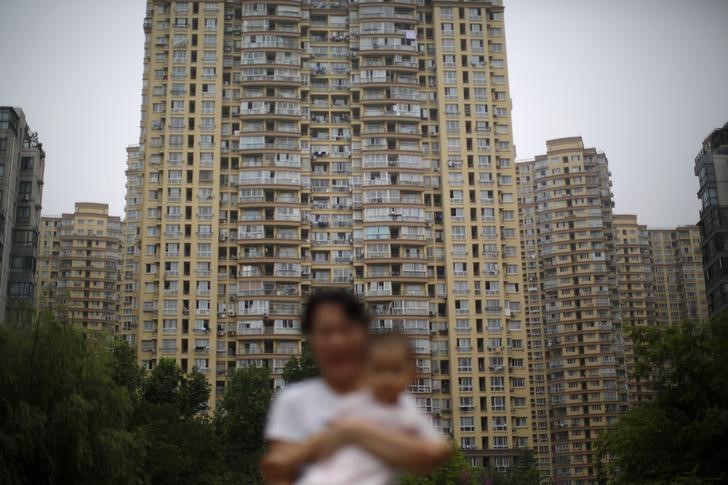By Xiaoyi Shao and Koh Gui Qing
BEIJING (Reuters) - China's new home prices fell significantly in December for a fourth straight month even as year-end sales volumes surged, a sombre omen for fourth-quarter 2014 economic growth data due out later in the week.
Sunday's gloomy National Bureau of Statistics' data foreshadowed weak economic figures set for Tuesday, with expansion expected to slow to 7.2 percent, the weakest since the depths of the global financial crisis.
Falling property prices are likely to keep pressure on policymakers to head off a sharper slowdown this year.
The expected slowdown in growth of the world's second-largest economy, from 7.3 percent in the July-September quarter, means the full-year figure would undershoot the government's 7.5 percent target and mark the weakest expansion in 24 years.
If the GDP data proves worse than expected, some analysts say the People's Bank of China (PBOC) could cut interest rates further or lower reserve requirement ratios (RRR) for all banks.A reserve ratio cut would give banks greater capacity to lend, but many market watchers question if they would be willing to increase their exposure as economic conditions deteriorate.
With real-estate investment accounting for about 15 percent of China's GDP growth, a 9 percent decline in new floor space under construction in the first 11 months of 2014 could take a heavy toll.
"We expect China's GDP growth to slow further in 2015 to 6.8 percent, as the ongoing property downturn leads to further weakness in construction and industrial production, and related investment," Tao Wang, China economist at UBS, wrote in a note.China's real estate market has been plagued by falling prices and high inventories in recent months, crimping demand in 40 economic sectors ranging from steel to cement to furniture.
The National Bureau of Statistics (NBS) data showed December's new home prices fell an average 4.3 percent year-on-year in 68 of the 70 major cities it monitors.
But in something of a policy success for Beijing, property sales volumes in December in 70 major cities hit the highest level seen in 2014, up nearly 9 percent from November, according to data from the NBS.Liu Jianwei, senior statistician at the NBS, said recent policy concessions, including November's official interest rate cut and cheaper loans, had boosted home-buying interest as developers pushed year-end sales.
China Vanke, China's top listed residential developer, reported a 129 percent surge in sales in December from a year earlier, while sales over the same period for mid-sized Country Garden leapt 167 percent.
But Wang Jun, senior economist at China Centre for International Economic Exchanges, a Beijing-based think tank, noted: "The oversupply fundamentals of China's property market have not been changed even though sales improved.
"Developers are not so confident on the property market outlook. That's why property investment growth continued to drop in the past months. No doubt the slowdown of the property market will continue to drag on the broad economy in 2015."
Property researcher CRIC concurred, saying housing supply remains excessive despite the pick-up in sales, with only two major cities out of 23 it studied seeing a decline in inventory at the end of December."In most Tier 2 or Tier 3 cities, inventory destocking remains the main task for local property markets in 2015," noted Liu Yuan, the head of research at Shanghai property consultant Centaline.Yet despite falling prices and a stock overhang, several Chinese developers have said they will launch more housing projects in 2015 as they strive to meet sales targets and boost market share - at the risk of adding to already-bloated inventories.
(This story has been refiled to correct formatting in paragraph 1, corrects spelling of Bureau in paragraph 2)
